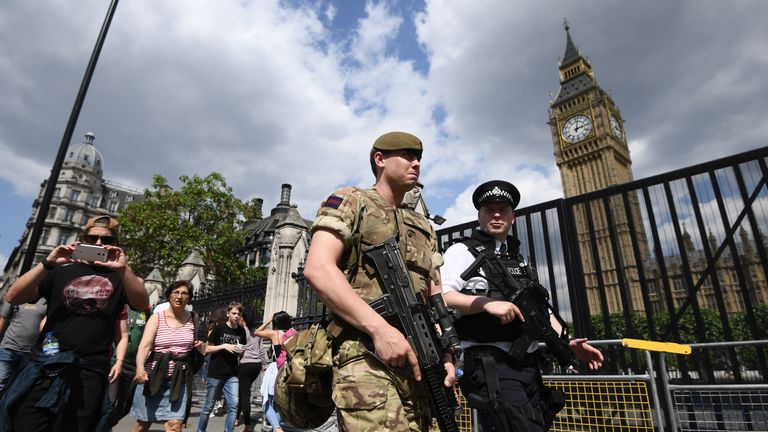UK seeks 'comprehensive' security deal with EU after Brexit
Ministers say simply matching existing arrangements between Brussels and non-EU countries would result in a "limited patchwork".
Monday 18 September 2017 17:24, UK
Britain wants a bespoke deal on security links with the European Union as part of proposals to maintain co-operation in the fight against terrorism and serious crime post-Brexit.
The Government says matching existing arrangements between the EU and other countries outside the bloc would result in a "limited patchwork".
Ministers instead want a "comprehensive" framework that would be underpinned by a new treaty and have unveiled their plans in a "future partnership" paper.
The blueprint stresses the need to avoid any "operational gaps" in the move from one system to another.
Britain's security and law-enforcement links with Brussels have come under scrutiny following last year's Brexit vote, with those questions intensifying in the wake of recent terror attacks in the UK and on the continent.
Senior policing and counter-terrorism figures have highlighted the role played by the European Arrest Warrant, the Second Generation Schengen Information System (SIS II) of real-time alerts, the European Criminal Records Information System (ECRIS) and the EU's law enforcement agency Europol.
The Government's latest Brexit paper acknowledges there are a number of states outside the EU that already have agreements with the bloc in areas such as sharing fingerprints and airline passenger data.
But it says: "While this would be one possible approach, it would result in a limited patchwork of cooperation falling well short of current capabilities.
"It would also fall short of current channels used to assess the strategic threats facing European countries, threats that will still be shared after the UK withdraws from the EU.
"A piecemeal approach to future UK-EU cooperation would therefore have more limited value, and would risk creating operational gaps for both the UK and for its European partners, increasing the risk for citizens across Europe."
The document says that because of the UK's proximity to its European neighbours, the volume of cross-border movements and the "high degree of alignment" in the scale and nature of the threats faced, a "new, more ambitious model for co-operation" is required.
Ministers want a new treaty to provide the legal basis for continued co-operation between the UK and EU.
The UK's role in the development and operation of a number of EU tools is highlighted in the paper, which says the UK "brings leading capabilities and expertise".
Critics of the Government's Brexit approach have queried how the UK can keep access to EU databases at the same time as meeting Theresa May's pledge to leave the direct jurisdiction of the European Court of Justice.
The paper does recognise that "dispute resolution" is something that will have to be considered as the new security relationship is worked out.
Liberal Democrat Sir Ed Davey said the paper was based on a "delusion", claiming the Tories "have once again shown they're prepared to put ideological obsessions above the safety and best interests of our country".


